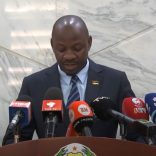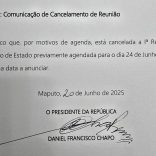Mozambique: Mondlane asks for international support at Oslo meeting - Watch
Mozambique government violated the Constitution – Teodato Hunguana on hidden debts

In File Club of Mozambique / Ematum's patrol vessels seen here docked in Maputo
Former information minister Teodato Hunguana on Tuesday accused the Mozambican government, then led by President Armando Guebuza, of violating the Constitution when, in 2013-2014, it issued government guarantees for the enormous loans contracted by the Mozambique Tuna Company (EMATUM), Mozambique Assets Management (MAM), and the maritime security company, Proindicus.
Speaking in the northern city of Nampula, at a meeting marking World Press Freedom Day, Hunguana said the government had violated Article 179 of the Constitution which states that it is in the exclusive power of the country’s parliament, the Assembly of the Republic “to authorize the government to contract or to grant loans, to undertake other credit operations, for a period longer than one financial year, and to establish the maximum limits on guarantees to be granted by the state”.
Yet the government guaranteed loans for EMATUM, Proindicus and MAM never came before the Assembly. Indeed the very existence of the Proindicus and MAM loans was not known to most parliamentary deputies, let alone the wider Mozambican public, until last month.
Hunguana, who was a member of parliament for the ruling Frelimo Party from 1995 to 2004, and later a judge on the Constitutional Council, is deeply versed in matters of constitutional law. He said there is no way that Constitutional commands can be overridden, even in the name of security concerns. Article three of the Constitution states clearly that “the State is subordinate to the Constitution”, and those who find it convenient to push parts of the Constitution aside are violating the Constitution.
Even a state of siege or state of emergency (neither of which has ever been declared in Mozambique) does not suspend the constitutional guarantees for the powers and functioning of sovereign bodies such as the Assembly of the Republic.
In the case of the guaranteed loans, the procedure followed by the government “did not obey the dictates of the Constitution”, said Hunguana. No justification based on security concerns, or of the power of the government to guarantee order would hold water “because in this area too the end do not justify the means. The ends fixed in the Constitution are pursued in the form and using the means also established by the Constitution. Not other forms and other means”.
Hunguana also attacked the secrecy in which the loans had been negotiated. The democratic rule of law “absolutely abominates secret governance”, he declared, before citing approvingly the inaugural speech of President Filipe Nyusi, made in January 2015.
Then Nyusi had declared “the members of this government must regard access to information as a right of citizenship enshrined in the constitution and the law. Our action must be based on the highest principles of government ethics, such as transparency, integrity, the primacy of law, impartiality, equity and social justice”.
The Guebuza government’s failure to observe the constitution was not only a serious attack on the powers of the Assembly, but also prejudiced the right of the people to information, said Hunguana.
He praised Prime Minister Carlos Agostinho do Rosario for his press conference last week on the public debt which “finally cast some light on and made public what should never have been secret”.
Although late, the information given by Rosario “responds, to some extent, to the people’s right to information. But only to some extent – because a press conference is an informal means, acceptable given the urgency of the circumstances, but it does no replace or dispense with the formal means, which is an appearance before the Assembly of the Republic”.
Thus Hunguana, although he is a member of the Frelimo Central Committee, threw his weight behind the demand of opposition parties that the government must inform the Assembly in detail about the debt crisis.
The Constitution, he continued, “is not something to be avoided or negotiated, but it is simply to be respected and complied with. By everyone, starting with the state institutions”.
“We cannot create the idea that there are some individuals, institutions or parties that are exempt from complying with the Constitution”, he warned. “Nor should we get used to underestimating violations of the constitution, minimizing their seriousness with excuses”.
When decisions as vital as those concerning the public debt are taken in violation of the Constitution, “the immediate implication”, Hunguana said, “is that we have two constitutions: the one that was passed in the Assembly, promulgated and published in the official gazette, and another one which we don’t know, which isn’t public, but in the light of which decisions can be taken which are equally valid and effective”.












Leave a Reply
Be the First to Comment!
You must be logged in to post a comment.
You must be logged in to post a comment.